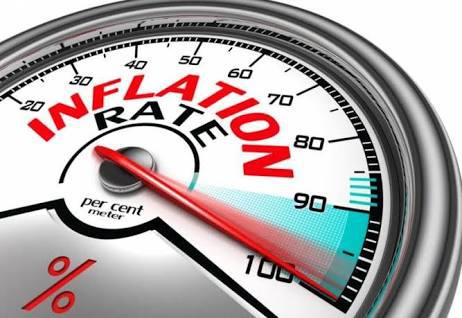By: Oluwaseyi Bangudu (Abuja, Nigeria) The Consumer Price Index (CPI), the index which measures the nation’s inflation, increased by 18.72 percent (year-on-year) in January 2017, 0.17 percentage points higher from the rate recorded in December 2016 (18.55) percent, the National Bureau of Statistics has revealed. This is the 15th consecutive month Nigeria would record an increase in inflation. The CPI measures the average change over time in prices of goods and services consumed by people for day-to-day living. The construction of the CPI combines economic theory, sampling and other statistical techniques using data from other surveys to produce a weighted measure of average price changes in the Nigerian economy. In its Consumer Price Index, January 2017 report, the Bureau says the faster pace of growth in headline inflation, year-on-year, were bread and cereals, meat, fish, oils and fats, potatoes, yams and other tubers, wine and spirits, clothing materials and accessories, electricity, cooking gas, liquid and solid fuels, motor cars and maintenance, vehicle spare parts and fuels and lubricants for personal transport equipment, passenger transport by road while Communication and Restaurants and Hotels recorded the slowest pace of growth in January, growing at 5.1 percent and 8.4 percent (year-on-year) respectively. During the month, the highest increases were seen in Housing, Water, Electricity, Gas and Other Fuels, Education and Transport growing at 27.2, 21.0 and 17.2 percent respectively. On a month-on-month basis, the Headline index increased albeit, at a slower pace in January 2017. The index increased by 1.01 percent point in January, 0.05 percent points from 1.06 per cent rate recorded in December 2016. On a month on month basis, headline inflation was driven by passenger transport by air, fuels and lubricants for personal transport equipment, liquid fuels, cooking gas, oils and fats, fruits, cheese and eggs, fish, meat and bread and cereals. “The Food Index increased by 17.82 percent (year-on-year) in January, up by 0.43 percent points from rate recorded in December 2016 (17.39) percent. During the month, all major food sub-indexes increased, with Soft Drinks recording the slowest pace of increase at 7.8 percent(year on year)” the report revealed. Though the magnitude and direction of the increase was contrary to expectations and consensus, a decomposition of the inflation numbers shows an imminent reversal in the inflation trend, Financial Derivatives Company, a diversified financial institution, has however, said. “This is because both core (inflation less seasonal factors) and monthly inflation rates tapered in January. The month of January is a period of post festivities in which consumer purchasing power typically contract”, it said, adding that the food basket was the major contributor to the surge in the headline rate. “Bread and cereals are exchange rate sensitive while meat, fish, tuber, oil and fats are less exchange rate sensitive. Therefore, forex market disequilibrium and structural supply bottlenecks most likely pushed up the prices of bread and cereals” the firm said, highlighting, however, that a price war orchestrated by the Dangote group ensued in the flour industry late January, with a downward revision in the price of flour from N11,500 to almost N10,500. “What this means is that we can expect a tapering in the price of bread in the coming months depending on the sustainability of this price trend” it added. The finance firm is of the opinion that distribution and logistics costs were responsible for the increased price movements recorded for more exchange rate insensitive food items. It noted that higher diesel prices, trading at an average of N270/ltr in January (92 per cent higher Year-on-Year), pushed distribution and logistics costs up and that low power generation (measly 2500 MW at the grid) increased the demand for diesel and contributed to its price surge in January. Experts are of the opinion that at its next meeting (towards the end of March), the monetary policy will have to factor certain macroeconomic statistics in its decision-making process. These include the fourth quarter 2016 GDP numbers, February inflation numbers (as the MPC meets towards the end of March) and the Purchasing Managers’ Index. Depending on the outcome of the data, the MPC will either consider embarking on an accommodative monetary stance agenda or holding off until a later period, Financial Derivatives Company, said. “M1 (a measure of money supply) remains a challenge to the Central Bank of Nigeria and it is growing at an increasingly fast pace relative to other monetary aggregates. Thus the CBN is tasked with not only controlling the supply of narrow money but also reducing the velocity of circulation to avoid further exaggerations in the price level”. “We expect that base year effects will begin to kick in February and as such we anticipate a likely reversal in the inflationary trend. This reversal in the trend of inflation is further reinforced if core and monthly inflation maintain their contracting trends”, the firm added. For Adverts Inquiries, call 08033857245; To Receive News Updates, WhatsApp: 08083609209; To Publish Your Articles Or News Stories, Email editor@skytrendnews.com. READ ALSO! Flying Bird Allegedly Falls From Sky In Lagos, Reportedly Turns To An Old Woman (PHOTOS) READ ALSO! READ What This Pretty Female Teacher Did With 3 Young Boys: You Will Be Shocked! READ ALSO ! This Doctor Filmed Himself Having Sex With Patient: What Happened Next Will Shock You! READ ALSO! I Never Knew There Was Something Sweet In Women Until I Married — ‘Virgin’ Pastor]]>

